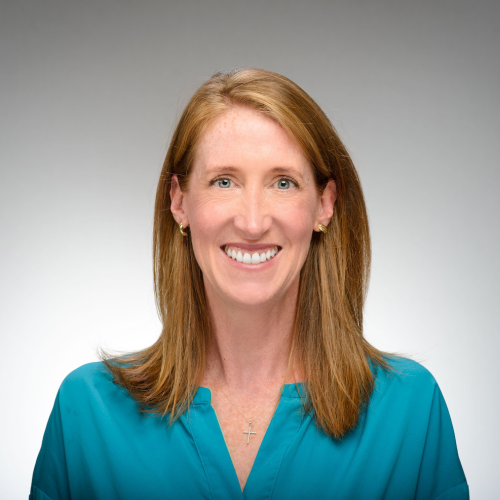Chrissy Trinter, Ph.D.
Director, ACE Ascent Program; Professor of the Practice, Alliance for Catholic Education

- Office
- 220 Remick Family Hall
- Phone
- 574-631-5763
- ctrinter@nd.edu
Christine Trinter serves as an Associate Professor of the Practice specializing in Mathematics Education with the Alliance for Catholic Education in the Institute for Educational Initiatives and is the Director of the ACE Ascent Program. Christine served as Acting Director of the Institute for Educational Initiatives from October 2023 to September 2024. She teaches mathematics education courses in the Master of Education program and mathematics and leadership courses in the Ascent Program. After earning her B.A. from Fordham University, Christine served in the Jesuit Volunteer Corps then taught in both Catholic and public middle and high schools in both Massachusetts and New York. She went on to earn an M.A. and a Ph.D. in mathematics education from Columbia University and the University of Virginia, respectively. Her research and scholarship focus on factors associated with teacher development, specifically related to teacher leadership and the integration of Catholic spirituality and mathematics education and the ways this integration contributes to the flourishing of both teachers and students.
Listen to Chrissy's episode of Think. Pair. Share.
Degrees
- 2011 Ph.D., Mathematics Education, University of Virginia
- 2001 M.A. Mathematics Education, Columbia University
- 1992-2006 44 mathematics credits, Fordham University, Columbia University, University of Virginia, Boston University
- 1996 B.A. Economics and Studio Art
Awards
- Curriculum and Studies Award, National Association for Gifted Children, 2010, 2011, 2012, 2013
- Design and Development Outstanding Practice Award, Association for Educational Communications and Technology, 2012
Publications
- Trinter, C. P., & Hughes, H. E. (2023). Better together: Implications for district and school leadership instating a collective model that includes teacher leaders as curriculum designers. In D. C. Virtue (Ed.), Dialogues in middle level education research volume 2: Insights from the AMLE New Directions 2021 roundtable discussions (pp. 97-104), New York, NY: Routledge.
- Trinter, C. & Hughes, H. (2021). Better Together: Implications for District and School Leadership Instating a Collective Model that Includes Teacher Leaders as Curriculum Designers. Book chapter in Dialogues in Middle Level Education Research Volume 2: Insights from the AMLE New Directions 2021 Roundtable Discussions.
- Trinter, C. & Hughes, H. (2021). Teachers as curriculum designers: inviting teachers into the productive struggle. Research in Middle Level Education, 44(3), 1-16.
- Trinter, C. & Carlson-Jaquez, H. (2018). An examination of the nature of post-observation feedback provided to middle school mathematics teachers. Journal of Mathematics Education Leadership, 19(1), 3-22.
- Ellington, A., Whitenack, J., Trinter, C. & Fennell, S. (2017). Preparing and implementing successful mathematics coaches and teacher leaders. Journal of Mathematical Behavior, 46, 146-151.
- Haver, W., Trinter, C., & Inge, V. (2017). The Virginia mathematics specialist initiative: Collaborative effort among all components of the VA mathematics community. Journal of Mathematical Behavior, 46, 289-302.
- Trinter, C. & Hope, S. (2016). The absence and presence of mathematics in teacher-led interdisciplinary unit design. Journal of Mathematics Education, 9(2), 4-21.
- Trinter, C. (2016). The importance of theoretical frameworks and mathematical constructs in designing digital tools. Journal of Computers in Mathematics and Science Teaching, 35(3), 269-293.
- Trinter, C., Brighton, C. & Moon, T. (2015). Differentiated educational games: discarding the one size fits all approach to educational game play. Gifted Child Today, 38(2), 88-94.
- Trinter, C., Moon, T., & Brighton, C. (2015). Characteristics of students' mathematical promise when engaging with problem-based learning units in primary classrooms. Journal of Advanced Academics, 26(1), 24-58. doi: 10.1177/1932202X14562394
- Garofalo, J., Trinter, C. & Swartz, B. (2015). Engaging with constructive and non-constructive proofs. Mathematics Teacher, 108(6), 422-428.
- Trinter, C. & Garofalo, J. (2013). I need more information! Mathematics Teacher, 106(2), 126-131.
- Garofalo, J. & Trinter, C. (2013). Using simulations to foster pre-service mathematics teachers' self-assessment, learning, and reflections on teaching. Mathematics Teacher Educator, 1(2), 162-171.
- Garofalo, J. & Trinter, C. (2012). Tasks that make connections through representations. Mathematics Teacher, 106(4), 302-307.
- Trinter, C. & Garofalo, J. (2011). Exploring non-routine functions algebraically and graphically. Mathematics Teacher, 104(7), 508-513.
 Alliance for Catholic Education
Alliance for Catholic Education